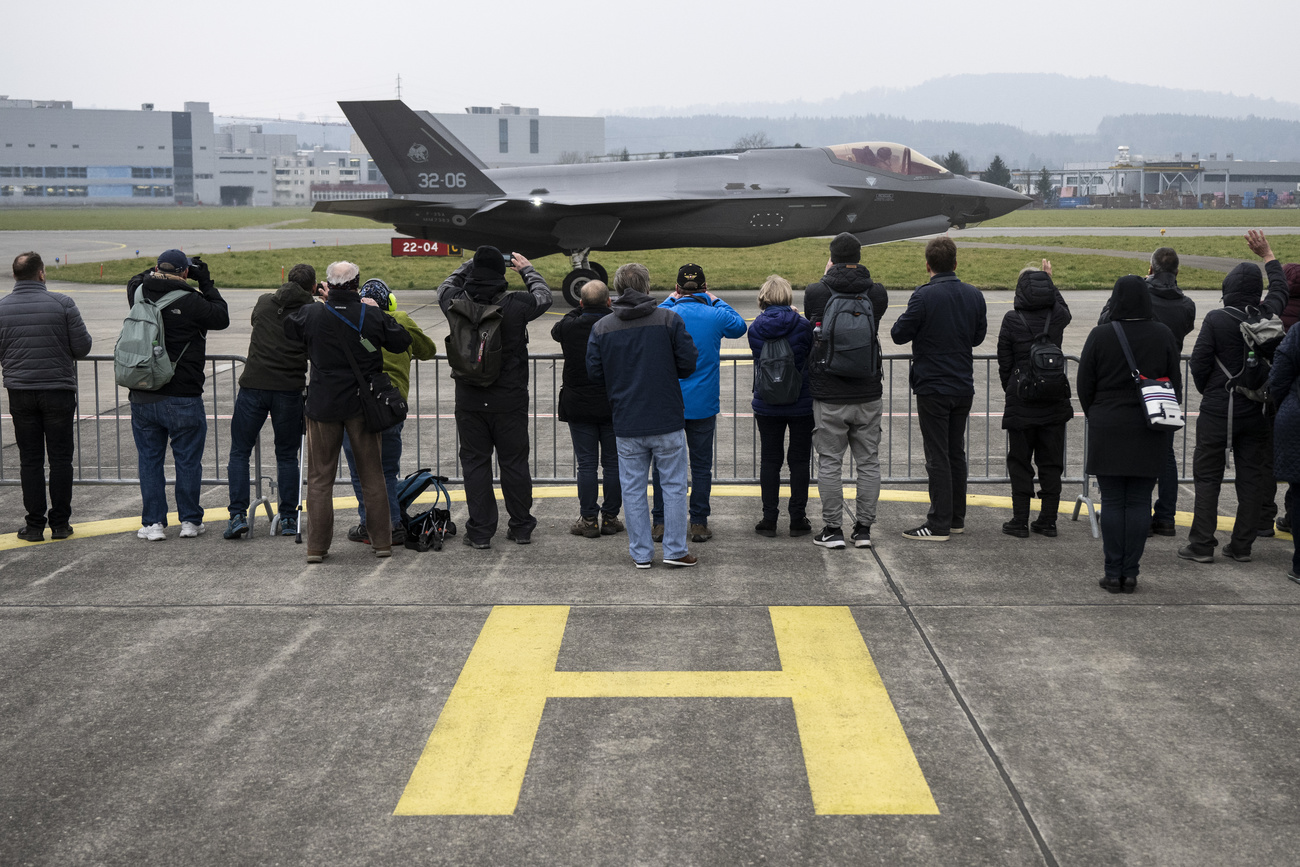
Swiss industry keen to cash in on F-35A fighter jet deal

Switzerland's contract for new Lockheed Martin fighter jets includes a windfall for Swiss industry: a promise of future contracts from the American aerospace giant. The pool of money is substantial but securing deals may prove challenging.
Suprem, based in Yverdon-les-Bains in canton Vaud, is one of the first companies poised to profit from Switzerland’s recent purchase of American F-35A combat aircraft.
This year, Switzerland spent CHF6 billion ($6.3 billion) on F-35A fighter jets made by Lockheed Martin. These jets will replace the army’s current fleet of F/A-18 Hornets and F-5s. When Switzerland procures military products from abroad, it is customary for the foreign suppliers to commit to compensatory purchases from Swiss industry. These commitments are called “offsets” or “offset agreements”. Their purpose is to support Swiss competitiveness and generate sales for Swiss industry, and their total value is negotiated between the Swiss authorities and the partner country. The offsets for the F-35A purchase were set at CHF2.9 billion.
Suprem specialises in high-tech materials for 3D printing and has already secured a memorandum of understanding with one of Lockheed Martin’s American subcontractors. This agreement, which excludes financial details, is not yet a binding contract but it positions Suprem well to benefit from the offsets.
“Our partner is the American aerospace group Northrop Grumman,” said Suprem CEO Anatole Gilliot. “Our SME [small or medium-sized enterprise] of 20 or so employees has had a relationship with the company for a few years already. We won’t contribute directly to the production of the F-35As, but we’ll develop a new generation of materials used in 3D printing.” Suprem did not disclose any further details about its finances or markets.
While the exact details of the agreement have yet to be hammered out, it is clear that it represents an extraordinary opportunity for Suprem. “We’ll benefit from the technical expertise of Northrop Grumman, which will test our materials under conditions specific to aeronautics,” explained Gilliot. “The agreement should give us access to this difficult market and also let us apply our skills to other things like hydrogen tanks and electric motors.”
Penalties built into in the F-35A contract
The final contract between Switzerland and the United States was signed on September 19th. It stipulates clearly that if the obligation to provide the offsets is not met, “a penalty will come into play”, said Jacqueline Stampfli, spokesperson for armasuisse, the Federal Office for Defence Procurement.
The parties involved in the compensation programme held a webinar at the beginning of November. This virtual meeting marked the start of a process that will take years – far from the public eye.
Securing part of the CHF2.9 billion from the United States would be hugely consequential for Swiss companies in the arms, aeronautical, machinery, and high-tech sectors. But the challenges they face are so significant that many were too nervous to speak with SWI swissinfo.ch.
A contract from a world leader in the aeronautical industry can offer a company new skills, new markets, and technology transfer. It can also be a valuable professional reference – it shows that the company’s expertise meets the most stringent requirements of the market. And, of course, a big contract can also create new jobs.
“Our goal, obviously, is to see the orders distributed equitably across the different linguistic regions of the country,” said Philippe Zahno, head of the Groupe romand pour le matériel de Défense et de Sécurité (GRPM), a defence-industry organisation for the French-speaking region of Switzerland. “We also want to make sure that the smallest SMEs are considered for contracts, not just the large well-established groups. Armasuisse has addressed this in its agreement.”
Companies need to make every effort
In practice, securing an offset contract is not an easy task. Zahno pointed out that many companies put in a bid, but only a few receive an order. “The level of expertise required is extremely high,” he explained. The companies mut go all out and take every chance they get to demonstrate their abilities. “Signing a contract for offsets is the result of years of networking,” observed Philippe Cordonier, head of the French-language section of Swissmem, a machine-industry association.
In SMEs, seemingly trivial obstacles like language can prove to be a big hurdle. The owners and employees aren’t always fluent in English, which is necessary for working with companies like Lockheed Martin. These SMEs also have more modest financial resources for marketing and communications. The GRPM and Swissmem can help as intermediaries, but they recognise their limits: everyone agrees that companies need to resolve critical issues amongst themselves.
Offset contracts under close scrutiny
Because the F-35A offset agreement is a hot issue, it is monitored closely by the Swiss authorities. Its appropriate size was fiercely debated among the political factions in parliament. In 2019, according to Cordonier, it took six rounds of back-and-forth between the two federal chambers to agree on 60% of the total value of the F-35A order. The allocation of contracts will be highly scrutinised.
“The offset transactions are subject to strict and transparent review. As soon as the contracts are signed with Lockheed Martin, the companies are listed in the offset register, which is publicly accessible,” Stampfli explained.
The offset process is overseen by the Control Committee (CC) of the Swiss Senate. “After the purchase of the FA-18 fleet almost 30 years ago, the offset contracts awarded ended up being a fraction of what had been announced,” said Charles Juillard, a centrist senator and member of the CC. “Which is why the Committee wanted to apply pressure from the beginning. We’ll make sure that there’s geographic equity among the contracts and that the orders reach the promised total.”
Offset agreements for the purchase of foreign-made military products are common practice internationally. Because of the magnitude of their financial benefits, they often cause controversy.
Belgium, in 2018, was the first European country to purchase F-35As. In 2020, the Brussels newspaper L’Écho questionned whether the country had negotiated well for the fleet; Lockheed Martin had successfully argued “military secrecy” to limit the size of the offset agreement. When Poland purchased F-35As in 2020, it waived an offset agreement because it felt the proposal was unsatisfactory.
Edited by Virginie Mangin

In compliance with the JTI standards
More: SWI swissinfo.ch certified by the Journalism Trust Initiative





























You can find an overview of ongoing debates with our journalists here . Please join us!
If you want to start a conversation about a topic raised in this article or want to report factual errors, email us at english@swissinfo.ch.